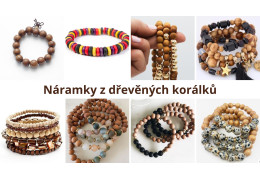Ebony Wood - Round Beads - Ø 8 mm, Hole: 1 mm
Genuine ebony beads with a diameter of 8 mm and a hole for a thread with a diameter of 1 mm. The beads are absolutely natural, without any dye. In addition, the beads have their typical ebony scent.
Country of origin of the bead production: India
THE PRICE IS FOR 1 PCS.
Genuine ebony beads with a diameter of 8 mm and a hole for a thread with a diameter of 1 mm. The beads are absolutely natural, without any dye. In addition, the beads have their typical ebony scent. The beads are of a very high quality thanks to perfect processing and storage, thus preserving their completely natural character. The beads are mainly used for the production of Eastern-style jewellery, where they originated.
Ebony wood, from which beads are made, is one of the rare hardwoods. The ebony tree, from which the ebony wood comes, has a thin layer of classically brown-colored wood under the bark, and the rest is made up of black, very hard and dense wood - ebony. Thanks to its high hardness, ebony wood is poorly sanded and smoothed to the required shapes, but it is excellent polishing and objects made from it can thus obtain a very shiny surface by polishing. Ebony trees grow in western equatorial Africa - the largest exporters of ebony wood are the states of Cameroon, Gabon and Nigeria. The beads are purely natural without any coloring.
Country of origin of the bead production: India
Due to the color setting of the monitor, the color of the goods may differ slightly from reality.
Data sheet
- Weight
- 1 ks cca 0,12 g
- Material
- Wood
- Shape
- Round
.
How to identify dyed minerals, artificial minerals and imitations? Simple hammer test can do the trick..
-
How to choose correctly?
-
What is the difference between waxing, dyeing, heating?
-
Why do beads fade?
-
Is there anything I can do against it?
-
Hammer tests for Jade, Agate, Malachite, Opalite, Azurite, Turquoise, Tyrkenite, Larimar, Hematite and Coral
-
When buying beads, why are there different color qualities from the same mineral on the same string?
.
A series of videos to help you navigate your bead selection. Watch the hammer tests where we show the differences in real minerals, synthetic substitutes and plastic imitation minerals. Fortunately, we have everything clearly marked on the Katlas Beads store, we never lie. This is a certainty which is hard to find on other e-shops.
From time to time, we come across someone complaining that they ordered a mineral in a certain colour and that some minerals have a slightly different shade or spots., how do we navigate the selection process? You need to understand that raw minerals are never identical. And it's proof that it's not an imitation or synthetic. On the Katlas beads eshop, you will come across multiple grades of qualities that address these queries.
After watching the videos, you will have accurate information and be able to navigate all the e-stores selling mineral beads.
Don't forget to subscribe to our YouTube channel. You won't miss any important videos and expert advice that will make you an expert in beading.
.
















